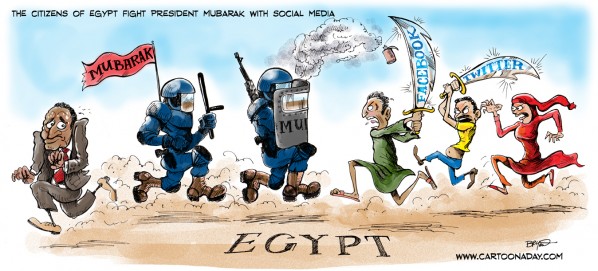Egypt's literacy rates are on the rise. The chart below and more
stats here that shows an upward trend in Egypt's Human Development Index.

Source:
UN Human Development Indicators
This CNN interactive shows the proliferation of the Internet, Facebook and phone use in Egypt and surrounding countries. The stats are two years old so one would imagine these figures have only risen.
Two thirds of Egypt's population is below the age of 30.
This combination of a rising literacy, increased proliferation of the Internet, and a mostly young population within the context of a corrupt government and stale leadership by president Mubarak, in short, meant that the internet-savvy youth (or what Flew (2008: 1) terms 'digital natives') could see a problem and this time they proposed a new solution-- a digital revolution.
My first post noted some of the key benefits of social media (SM), and to draw on media theorists, here are a few more key points:
- Protesters can become both producers and consumers, and hence, take control of communication platforms and disseminate their messages to a wide audience (not just Egypt's two state-controlled TV stations) (DiMaggio et al. 2001: 307)
- SM is easy to use and start-up, with a simple design so there are limited barriers to engagement (Nielson 2000). It should be noted that there remains a significant digital divide that should also be addressed in our feature.
- You can act cheaply and quickly, with high media visibility due to the removal of physical restraints (Miller 2004: 208-13).
Woolgar (2002) also makes some important points from his research into uses of new media in the UK, which can be found in the social media chapter of our Flew textbook. Particularly that:
- virtual interactions supplement rather than substitute 'real' activities
- more scope for virtual interaction often leads to greater stimulus for more face-to-face interaction.
In our feature, a key part of understanding why SM played an important role in the Egyptian revolution is to firstly understand the cultural practices that enable users to engage in the technology to begin with (Cranny-Francis 2005: 120). Therefore, the questions why social media and why now provide important links, and would make for good 'pages' in the feature.
References
Cranny-Francis, Anne (2005)
Multimedia: Texts and Contexts, Sage: London.
DiMaggio, Paul et al. (2001) 'Social Implications of the Internet,'
Annual Review of Sociology, 27: 307-36.
Flew, Terry (2008)
New Media: an Introduction (3rd ed), Oxford University Press: South Melbourne.
Miller, Paul (2004)
'The Rise of Network Campaigning,' in H. McCarthy, et al. (eds),
Network Logic: Who Governs in an Interconnected World? DEMOS: London, pp. 207-17.
Nielson, Jakob (2000)
Designing Web Usability, New Riders: Indianapolis.
Woolgar, Steve (2002), 'Five Rules of Virtuality', in S. Woolgar (ed.),
Virtual Society? Technology, Cyberbole, Reality. Oxford University Press: Oxford, pp. 1-22.
 Use of Online Communication Technologies for people over 18
Use of Online Communication Technologies for people over 18







